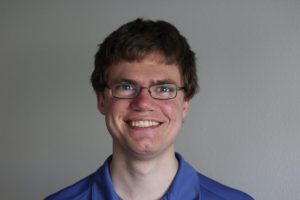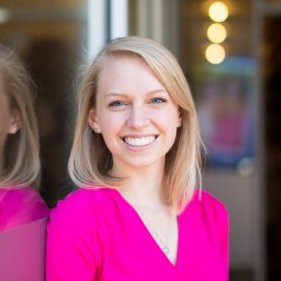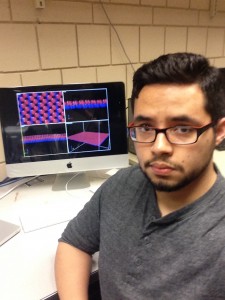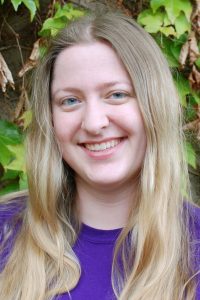Four students who have spent time in Iowa State’s engineering programs have been selected for the National Science Foundation’s Graduate Research Fellowship Program. The students are among 2,000 individuals receiving awards in 2016 out of 17,000 applicants.
Two students, Trent Borman and Rachel Creighton, attended Iowa State University as undergraduates and are now doing graduate work elsewhere. Oswaldo Sanchez and Rainie Nelson, however, attended other universities for their undergraduate work and are now doing graduate work at Iowa State.
 Trent Borman graduated from Iowa State with a B.S. in materials engineering in 2014. He is currently completing an M.S. at Penn State and will then be attending NC State for his Ph.D. Borman’s research is in the area of high entropy materials. His team is working toward achieving entropy stabilization with ceramics like oxides, nitrides and carbides.
Trent Borman graduated from Iowa State with a B.S. in materials engineering in 2014. He is currently completing an M.S. at Penn State and will then be attending NC State for his Ph.D. Borman’s research is in the area of high entropy materials. His team is working toward achieving entropy stabilization with ceramics like oxides, nitrides and carbides.
When stabilization is achieved, the high entropy of the material causes the crystalline phase to be stable, meaning the material is more resistant to defects and can remain stable at higher temperatures. This area of research is expanding rapidly and currently has potential applications for batteries and fuel cells among other areas. “Right now it is a rather exploratory field,” says Borman, “but given the novel properties that have arisen in high entropy metals, we are optimistic about its potential.”
 Rachel Creighton is studying bioengineering at the University of Washington and works in the Woodrow Lab studying biomaterials approaches to preventing and treating mucosal infections. The project she is currently involved with looks at prevention of HIV infection by analyzing the effects of nanoparticle encapsulation of antiretroviral drugs.
Rachel Creighton is studying bioengineering at the University of Washington and works in the Woodrow Lab studying biomaterials approaches to preventing and treating mucosal infections. The project she is currently involved with looks at prevention of HIV infection by analyzing the effects of nanoparticle encapsulation of antiretroviral drugs.
“It is already known that combinations of antiretroviral drugs with different mechanisms of action are very effective at preventing HIV infection,” Creighton says. Their lab has done studies loading small amounts of drugs into the particles, showing that drugs encapsulated separately in nanoparticles were more potent than free drug combinations. “Our hypothesis is that if we can increase the amount of drug in the particles, we can further enhance the potency of the drug combination.” The team’s research will be able to improve treatment and prevention of the HIV virus. Creighton graduated from Iowa State in 2015 with a B.S. in materials engineering.
 Oswaldo Sanchez graduated from Morningside College in 2015 with B.S. degrees in engineering physics and mathematics and is currently working on a Ph.D. in mechanical engineering at Iowa State. His research looks at “two-dimensional materials,” also called single-layer materials because they are made up of only a single layer of atoms.
Oswaldo Sanchez graduated from Morningside College in 2015 with B.S. degrees in engineering physics and mathematics and is currently working on a Ph.D. in mechanical engineering at Iowa State. His research looks at “two-dimensional materials,” also called single-layer materials because they are made up of only a single layer of atoms.
These materials are of interest to scholars because they behave differently than their bulk forms. Sanchez works with phosphorene, the two-dimensional version of phosphorus. He analyzes the thermal transport properties of this material by running molecular dynamics simulations. “These materials demonstrate favorable properties that offer promising potential for applications in electronics, optoelectics and photovoltaics,” says Sanchez.
 Rainie Nelson works with Matthew Panthani, assistant professor of chemical and biological engineering and Herbert L. Stiles Faculty Fellow, on creating solution-processed solar cells with earth-abundant and non-toxic elements. Solar cells respond differently to different processing conditions and treatments, so Nelson is working to find the most efficient materials and systems.
Rainie Nelson works with Matthew Panthani, assistant professor of chemical and biological engineering and Herbert L. Stiles Faculty Fellow, on creating solution-processed solar cells with earth-abundant and non-toxic elements. Solar cells respond differently to different processing conditions and treatments, so Nelson is working to find the most efficient materials and systems.
“The long-term goal is to develop a highly efficient material system that could be potentially scaled-up to provide electricity on a global scale,” Nelson says. To reach its goal, the team is focusing on keeping production costs low, allowing solar energy to better compete with non-renewable energy sources while also providing a product at lower consumer costs that don’t rely on federal subsidies. Nelson graduated from the University of Washington with a B.S. in chemical engineering in 2014 and is currently working on a Ph.D. at Iowa State in chemical engineering.